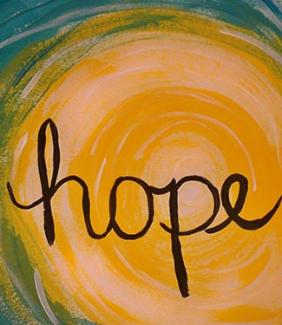by Ivonne Ortiz, NRCDV Vice President of Programs, Prevention and Social Change
It has been said that a person can live about 40 days without food, about three days without water, about eight minutes without air, but only for one second without hope. Many people believe that when you lose hope, you lose everything. For victim advocates, hope has a unique look and feel. For some, hope can be the lifeline to surviving one more night or the fuel to continue the work to eradicate gender-based violence. The hope of making a difference in a survivor’s life is the only thing that keeps them working towards creating social change. You see, without hope, it is really hard to envision a world without violence. The human heart is fueled by hope. It is what keeps a lot of us going each day.
So how can we be messengers of hope when our communities continue to experience uncertainty and chaos? It’s not easy, but in order to share a message of hope, we need to have a shared goal. Our communities need to have something to look forward to: a brighter future, a promise to hold on to, the idea that everyone belongs and is valued. We need to stand together in celebration of the rich diversity of people in this country an the vitality and strength they bring to our communities and societies.
Throughout the United States, organizations are actively working to engage their communities in developing and implementing community-driven solutions to domestic violence that promote hope, trust, safety, compassion, connectedness and shared responsibility for healing. One of these solutions is based on the concept of beloved community, an idea popularized by Dr. Martin Luther King, Jr. - a world void of oppression, discrimination, violence and bigotry that is fueled instead by friendship, good will and deep human connection. This community-driven strategy offers a framework for love and accountability in response to domestic violence.
According to Transforming Communities, a beloved community approach provides domestic violence organizations an opportunity to focus on prevention work within the context of the community. It focuses on building relationships in order to heal hurting people and broken communities. In practice, it offers a chance to honor each other and develop and hold a common purpose and vision by:
- Putting people and community at the center,
- Creating transformation within ourselves,
- Creating transformation within our organizations, and
- Engaging the community to create a vision for a new movement.
Research suggests that a strengths-based approach has a positive psychological impact, particularly in enhancing individual well-being through development of hope (Ralph, Lambric and Steele, 1996; Scheel, Davis & Henderson, 2012; Rashid, 2015; White & Waters, 2015). One of the goals of this practice is to enable people to look beyond their immediate and real problems and dare to conceive a future that inspires them. There are a number of different elements that constitute strengths, including:
- personal resources,
- abilities and skills,
- knowledge,
- people’s social network and its resources, and
- community resources, also known as “social capital.”
As advocates and messengers of hope, we don’t want to promote unrealistic optimism about the future, but where there is room for hope, it should be encouraged. We must intentionally strive to be messengers of hope, community reconcilers, justice-makers, and healers at the same time that we encourage our communities to look within themselves and find those strengths that have carried them on for generations. One second is all it takes to inspire hope.
You can find additional ideas on promoting hope through a strength-based community approach in the following resources:
ABCD Institute: The Asset-Based Community Development Institute (ABCD) is at the center of a large and growing movement that considers local assets as the primary building blocks of sustainable community development.
Community Resilience Cookbook: The Community Resilience Cookbook is a compilation of lessons learned and an interactive tool for fostering resilient communities. It was created by the Health Federation of Philadelphia (HFP), with support from the Robert Wood Johnson Foundation (RWJF.)
Move to End Violence - Beloved Community: This page offers information and tools for applying the beloved community approach to our movement to end gender-based violence.
Image from Make Me Stronger.














